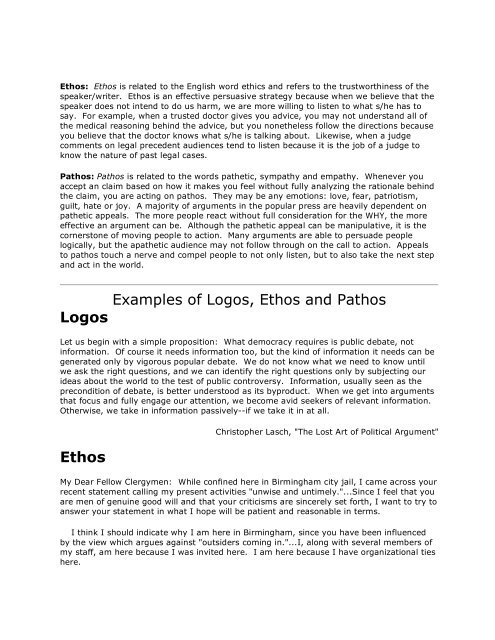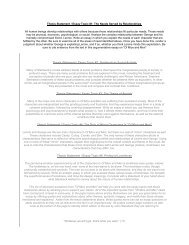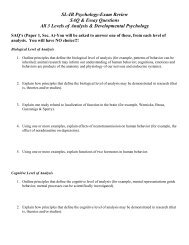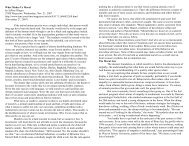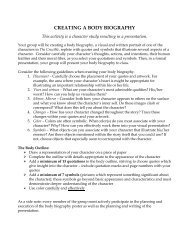Logos, Ethos and Pathos
Logos, Ethos and Pathos
Logos, Ethos and Pathos
Create successful ePaper yourself
Turn your PDF publications into a flip-book with our unique Google optimized e-Paper software.
<strong>Ethos</strong>: <strong>Ethos</strong> is related to the English word ethics <strong>and</strong> refers to the trustworthiness of the<br />
speaker/writer. <strong>Ethos</strong> is an effective persuasive strategy because when we believe that the<br />
speaker does not intend to do us harm, we are more willing to listen to what s/he has to<br />
say. For example, when a trusted doctor gives you advice, you may not underst<strong>and</strong> all of<br />
the medical reasoning behind the advice, but you nonetheless follow the directions because<br />
you believe that the doctor knows what s/he is talking about. Likewise, when a judge<br />
comments on legal precedent audiences tend to listen because it is the job of a judge to<br />
know the nature of past legal cases.<br />
<strong>Pathos</strong>: <strong>Pathos</strong> is related to the words pathetic, sympathy <strong>and</strong> empathy. Whenever you<br />
accept an claim based on how it makes you feel without fully analyzing the rationale behind<br />
the claim, you are acting on pathos. They may be any emotions: love, fear, patriotism,<br />
guilt, hate or joy. A majority of arguments in the popular press are heavily dependent on<br />
pathetic appeals. The more people react without full consideration for the WHY, the more<br />
effective an argument can be. Although the pathetic appeal can be manipulative, it is the<br />
cornerstone of moving people to action. Many arguments are able to persuade people<br />
logically, but the apathetic audience may not follow through on the call to action. Appeals<br />
to pathos touch a nerve <strong>and</strong> compel people to not only listen, but to also take the next step<br />
<strong>and</strong> act in the world.<br />
<strong>Logos</strong><br />
Examples of <strong>Logos</strong>, <strong>Ethos</strong> <strong>and</strong> <strong>Pathos</strong><br />
Let us begin with a simple proposition: What democracy requires is public debate, not<br />
information. Of course it needs information too, but the kind of information it needs can be<br />
generated only by vigorous popular debate. We do not know what we need to know until<br />
we ask the right questions, <strong>and</strong> we can identify the right questions only by subjecting our<br />
ideas about the world to the test of public controversy. Information, usually seen as the<br />
precondition of debate, is better understood as its byproduct. When we get into arguments<br />
that focus <strong>and</strong> fully engage our attention, we become avid seekers of relevant information.<br />
Otherwise, we take in information passively--if we take it in at all.<br />
<strong>Ethos</strong><br />
Christopher Lasch, "The Lost Art of Political Argument"<br />
My Dear Fellow Clergymen: While confined here in Birmingham city jail, I came across your<br />
recent statement calling my present activities "unwise <strong>and</strong> untimely."...Since I feel that you<br />
are men of genuine good will <strong>and</strong> that your criticisms are sincerely set forth, I want to try to<br />
answer your statement in what I hope will be patient <strong>and</strong> reasonable in terms.<br />
I think I should indicate why I am here in Birmingham, since you have been influenced<br />
by the view which argues against "outsiders coming in."...I, along with several members of<br />
my staff, am here because I was invited here. I am here because I have organizational ties<br />
here.


